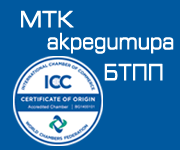Назад
Назад
BCCI's position regarding the political situation in Bulgaria
In consequence of this resignation, important issues will remain unresolved, hampering the economic activities of the business entrepreneurship, namely:
- ineffective control of all governmental regulatory authorities;
- high degree of administrative regulation and administrative fees, inconsistent with the cost of administration;
- lack of conditions for competition and transparency in the activities of the now monopolised business areas;
- high public expenditure, incl. those in support of political parties (grants, properties, etc.);
- lack of effective measures restricting the preconditions for the existence of grey economy and corruption, especially in the public procurement implementation procedures;
- lack of internal regulatory safeguards for timely state payment of the contractual obligations to the private sector, pursuant to the general principles of EU Directive 2000/35/EC;
- Lack of opportune and substantiated answers to proposals addressed by the civil society to public authorities, and of publicity of the arguments on the basis of which the authorities refuse to accept such proposals.
- In order to clarify the position of entrepreneurs concerning the demands of protesting citizens, BCCI held an emergency consultation with its members.
The analysis of the questionnaire results has shown as follows:
- 75 % of the respondents insist that the institutions in Bulgaria should continue their activities responsibly;
- 41% support the protesters’ claim to have a compulsory civil quota at all management levels and all governmental regulatory authorities, thus expressing their belief that this will result in active and effective civilian control over the activities of the institutions and will ensure government transparency. (However, in the opinion of BCCI, this demand raises serious constitutional, legal and practical problems);
- 92% of the respondents are categorical that MPs and ministers should not enjoy privileges in the event of criminal responsibility for their actions;
- 76% of all respondents are convinced that the increase in the salaries, administratively, will deepen business problems.
BCCI cannot support the demands of the protesters, not complying with the effective regulations, e.g.:
- immediate termination of all lawsuits - until establishment of the reasonableness of the bills - against customers of the energy distributors, “Toplofikatsia” (central heating) and water suppliers;
- nationalisation of activities related to energy distribution.
BCCI is of the opinion that all requests to increase earnings and pensions, without being tied to the gross domestic product, will result in destabilisation of the state budget, raising the tax rates, growing inflation, and loss of investors’ confidence. Such demands will inevitably lead to further cuts, mostly in small and medium business, to new escalation of higher wages, redistribution of market shares in favour of the big business. BCCI has always expressed the opinion that the maintenance of financial stability is directly related to maintaining the conditions of the Monetary Board and a low level of the budget deficit.
In forming the caretaker cabinet pursuant to Article 99 (5) of the Constitution of the Republic of Bulgaria, the BCCI members insist that the appointed caretaker government will actively work not only to organise the next elections, but also for responsible performance of the functions of all state institutions, including:
- strict observance of the regulatory requirements by the state power, incl. the private property protection;
- full transparency and publicity in the work of the state institutions;
- timely and quality administrative services;
- observance of the fiscal discipline and preserving the financial stability;
- compliance with the principle of “the state – a prompt payer” - observance of deadlines for payments by the state to the private sector;
- continuation of the work related to the development of operational programs and the indicative allocation of EU funds under these programs, with particular attention being paid to multi-fund programs;
- preparation of the Partnership Agreement, with particular emphasis on measures to ensure compliance with the pre-conditions (conditionalities) of the European Commission;
- provision of safeguards for a stable political environment and a peaceful internal order, creating the conditions for entrepreneurship activities.
- involvement of the civil society in public and state-public bodies, via its competent representatives.
04.03.2013

 1 USD =
1 USD =  1 GBP =
1 GBP =  1 CHF =
1 CHF =  ISO 9001:2015
ISO 9001:2015




























